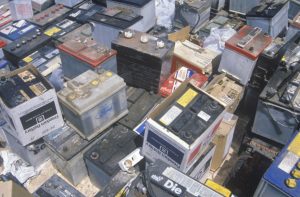PhD Insights: Novel recycling of lead batteries for people and planet
By Enrico Manfredi-Haylock, a member of the Transition to Zero Pollution cohort.
Did you know that the battery in your car is the most recycled item in the world? Its recycling process is considered as a gold standard example for the future circular economy of consumer goods.
The humble Lead Acid Battery (or LAB for short) was invented more than 100 years ago and today it is widely used for starting cars, keeping data centres running and storing renewable electricity. The lead used in these batteries is relatively easy to recover through a smelting process with no loss of quality of the recycled product so it can be used again and again. In fact, the metal in your car battery may have already gone through several incarnations of batteries before getting to you! In Europe and the USA it is estimated that over 95% of batteries are collected and recycled to make new batteries.

But if LAB recycling is so successful, what’s the problem? Firstly, this process has a relatively high carbon footprint of 0.12kg of CO2 per kg of lead recycled. While that doesn’t sound too bad, consider that the world recycles millions of tonnes of lead per day! Secondly, batteries that are recycled improperly cause a pollution that is much worse than CO2.
In many developing nations, car batteries are recycled by hand in small cottage industries, in homemade furnaces, by workers who hack batteries apart with improvised tools for a pittance. These workers are fully aware that the lead in the batteries they break could cost them their life. Nonetheless, they choose to go ahead with this work because they have no other source of income. Used LAB recycling in developing nations was classed by the WHO and the Blacksmith Institute to be the most polluting industry of all, shortening life expectancy significantly for both workers and their families.

It is therefore imperative to solve the pollution problems of lead recycling for these small informal recycling activities in the developing world; both to save our planet and our people. However, it is also important to recognise how many rely on this activity for a living. Restricting it may simply make the problem worse. Instead in this project we propose to introduce a novel chemical technique for the recycling of lead based on a new class of solvent that can be easily synthesised from everyday natural ingredients. The aim would be to develop this process to be as cheap and reliable as possible and to provide this technology directly to the people who need it with the help of local partners and charities. It is hoped that this approach can clean up the pollution from this industry, while keeping that invaluable economic lifeline in place for the world’s most vulnerable communities.